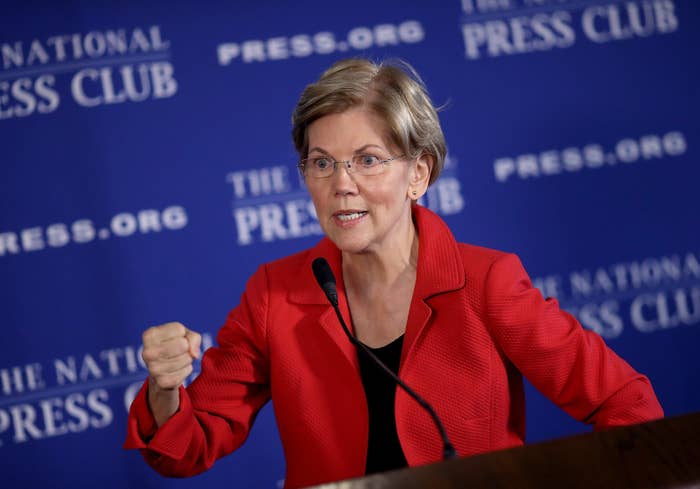
Sen. Elizabeth Warren introduced a sweeping anti-corruption bill Tuesday that would implement lifetime lobbying bans on many federal officials, forbid Congress members and federal judges from owning stocks, and force presidential candidates to release their tax returns, among dozens of other reforms.
The far-reaching Anti-Corruption and Public Integrity Act, which would cut deeply against the financial interests of many of Warren's colleagues, has almost no chance of passing in Congress, even if Democrats take control of both chambers.
But as Warren takes serious steps toward running for president in 2020, the bill could become a cornerstone of a national campaign, one focused in part on a message that has already been proven to resonate with voters: draining the swamp.
In a speech Tuesday, Warren spun her anti-corruption proposals into a broader message of restoring Americans' faith in the federal government — a faith that, she argued, had been eroded by the force of money and special interests in politics.
"Our government systematically favors the rich over the poor, the donor class over the working class, the well-connected over the disconnected," Warren said. "This is deliberate, and we need to call this what it is — corruption, plain and simple."
As other potential presidential contenders in the Senate scramble to introduce bills that could bolster their campaigns, on topics from marijuana legalization to guaranteed jobs, Warren has focused on measures that use the federal government to strike against the interests of the wealthy. A corporate reform bill she introduced last week would require publicly traded companies to consider the interests of people other than shareholders, including employees.
Congressional Democrats have already zeroed in on "anti-corruption" measures as a message they believe will be effective against President Donald Trump in 2018 and beyond. In May, they introduced a plank to their "A Better Deal" platform that proposed campaign finance reforms and smaller-scale ethics reforms, like increased oversight of lobbyists.
But Warren's bill goes significantly farther than anything proposed by her Democratic colleagues — another sign that the bill is unlikely to make much headway even in a Democratic Congress.
Like many Democrats mulling runs for president, Warren has sought to position herself as a fighter against the Trump administration. The bill, in part, would take aim at Trump — requiring the release of financial disclosures and forcing the president and senior administration officials to to divest from private assets. It would ban Americans from foreign lobbying — a central part of the case against former Trump campaign officials Paul Manafort and Rick Gates.
But, she said in her speech Tuesday, the Trump administration was "not the cause of the rot. They’re just the biggest, stinkiest example of it."
